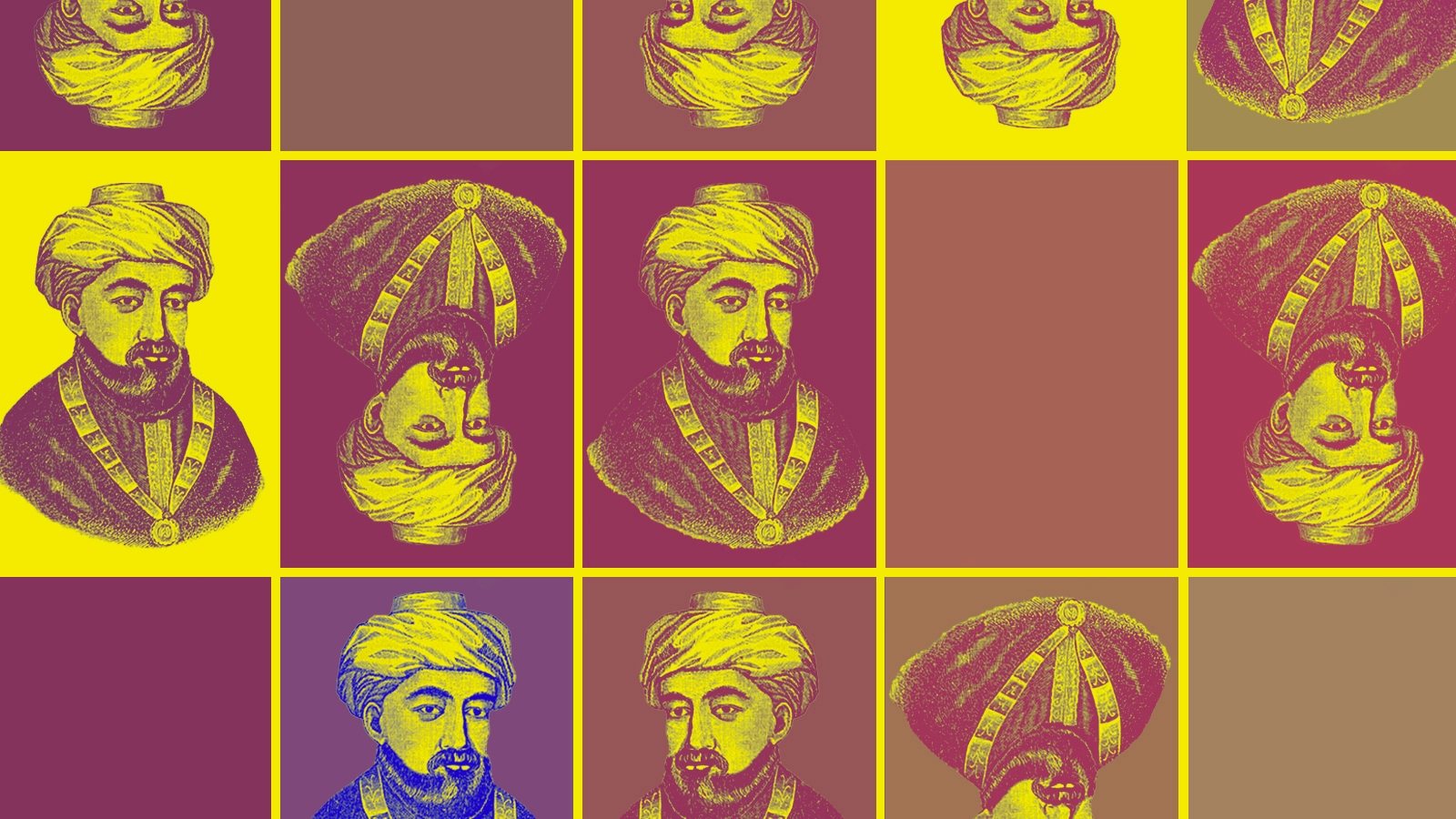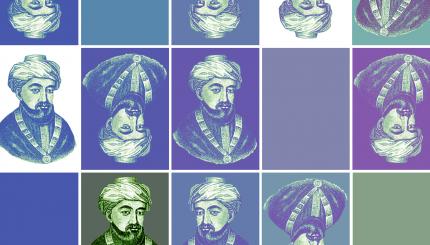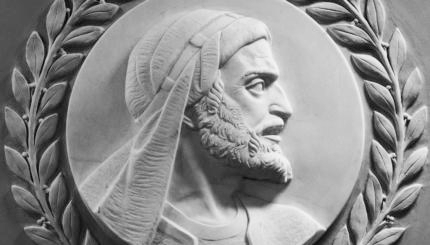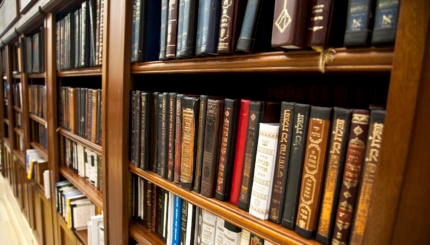It has been a long day’s work as a physician in the sultan’s palace in Cairo attending to the medical needs of the chief vizier and other senior advisers. You mount your horse and ride nearly an hour home to the suburb of Fustat. You haven’t eaten all day, and you arrive hungry and dusty to find your front room full of people — Jewish, Christian, and Muslim, wealthy and poor, members of all guilds and professions — who, like the palace retinue, require your medical expertise. This is a regular afternoon occurrence. What do you do?
If you are Moses Maimonides, you dismount your horse, wash your hands, quickly eat a small lunch, and then get right to work examining patients and prescribing treatments until you have been working in the dark, by candlelight, for several hours. You fall into bed exhausted without so much as a word to your family and repeat the same routine the next day, waiting for Shabbat so you can visit with friends and family and turn your attention to some of your other interests.
Maimonides himself described this scene in a letter to Samuel ibn Tibbon, the Hebrew translator of his magnum opus, The Guide of the Perplexed. Ibn Tibbon had asked if he could make the journey from his home in the south of France to review some questions about the translation. Maimonides enthusiastically welcomed him to visit, but cautioned that they would not be able to spend much time discussing the work because of his busy schedule, which he laid out in detail.
The letter to ibn Tibbon is among many that Maimonides wrote in response to requests for guidance on issues spanning nearly every possible human concern. In his letters, Maimonides not only answered questions and proposed solutions, but also showed himself to be a community leader who assumed responsibility for the Jewish community in the broadest sense, offering both guidance and empathy for Jews and Jewish communities throughout the Mediterranean basin and beyond.

Help us keep Jewish knowledge accessible to millions of people around the world.
Your donation to My Jewish Learning fuels endless journeys of Jewish discovery. With your help, My Jewish Learning can continue to provide nonstop opportunities for learning, connection and growth.
Jews living in Islamic lands in the Middle Ages faced varying degrees of tolerance and persecution. Maimonides himself had left his native Spain following the rise of the Almohad empire, which had imposed more restrictions on Jewish residents than earlier regimes. Many sources, both Jewish and Muslim, report that Maimonides converted to Islam all the same, renouncing his conversion only after resettling in Egypt. His friend Joseph ibn Aqnin describes him as having had mixed feelings about this and having continued to study Torah in private. In light of his own experience and his learning, Maimonides was well positioned to offer guidance in navigating these complexities.
In what came to be known as his Epistle on Martyrdom, Maimonides took up the question of whether it was preferable to convert or become a martyr. He wrote the letter in reply to a question posed by a North African Jew who wanted to know whether it was permissible to swear the Islamic article of faith — “there is no god but God and Muhammad is His messenger” — to avoid being killed. The letter writer had already posed this question to another rabbi, who apparently answered that anyone who affirmed the prophecy of Muhammad or otherwise behaved publicly like a non-Jew, whether under duress or not, was “wicked” — regardless of their intentions and especially if they kept observing and practicing Judaism privately.
Sign up here for “There Was None Like Maimonides,” My Jewish Learning’s email series about the legendary Jewish thinker.
Maimonides disagreed forcefully. He wrote that while leaving lands where Jews cannot practice openly is the best solution, if that is not possible then professing faith in Muhammad and continuing to observe Judaism in private was the way to proceed, offering both biblical and historical examples of this kind of self-protective behavior. He also asserted that simply making a declaration against Judaism was not worth dying over, as some historical situations might have been: “There has never yet been a persecution as remarkable as this one, where the only coercion is to say something,” he wrote, referring to the advent of the Almohad caliphate and the limits it imposed on religious minorities. “When our rabbis ruled that a person is to surrender himself to death and not transgress, it does not seem likely that they had in mind speech that did not involve action.” [This and other translations are taken from A Maimonides Reader, edited by Isadore Twersky.]
This epistle shows that Maimonides had thought deeply about the circumstances of his own civic life and that of other Jews living under Almohad rule. His response was based on his cognizance of the reality on the ground. Throughout the epistle, he writes about the situation in the first person plural (“we”). Some scholars see this as evidence that Maimonides included himself amongst the forced converts to Islam, while others suggest it is a stylistic quirk. Either way, what is clear is that as a community leader, Maimonides was deeply identified with those who sought his counsel and very much spoke their languages.
In response to a direct query from a Yemeni Jew whose community found itself under pressure to convert, Maimonides encouraged fostering Jewish identity and belief through community solidarity, writing: “Now, all my fellow countrymen in the Diaspora, it behooves you to hearten one another, the elders to guide the youth, the leaders to direct the masses,” he wrote. “Gain the assent of your community to the Truth that is immutable.” He also stressed the importance of including younger members of the community: “It is imperative, my fellow Jews, that you make this great spectacle of the revelation appeal to the imagination of your children,” he wrote. As in the Epistle on Martyrdom, Maimonides expresses a kind of affinity with the community seeking his advice. Throughout the Epistle to Yemen he addresses “my fellow Jews” and uses similar phrases affirming their shared system of beliefs and ethics.
This holistic and humane approach to community building extended not only to Jews forced to convert, but also to individuals who chose Judaism. He wrote a short response to a man named Obadiah, who had written to ask if he should avoid reciting liturgical formulations like “our God and God of our fathers” because he was not born a Jew. Maimonides assured him that he should, writing: “In the same way as every Jew by birth says his blessings and prayers, you, too, shall bless and pray alike whether you are alone or pray in the congregation. The reason for this is that Abraham our father taught the people, opened their minds, and revealed to them the true faith and unity of God … ever since then whoever adopts Judaism and confesses the unity of the Divine Name is counted among the disciples of Abraham our father.”
Of course, it wasn’t all martyrdom and conversion. Maimonides was also a sought after guide on all manner of religious and cultural questions. In another missive he responds to a group of French rabbis about whether “all the statements of the astrologers and the stargazers” can be taken seriously. Even though the answer to this question was spelled out in the Mishneh Torah, widely available across the Mediterranean by that point (which he made sure to mention to the rabbis, who seemed not to have read the book yet), he took the time to provide them with a distillation of his argument, which, in short, is: no. “All those assertions are far from being scientific; they are stupidity,” he writes, in what has come to be known as the Letter on Astrology, explaining that people should believe only things they can perceive themselves, justify through reason, or that are revealed by God through the prophets.
He also corresponded with another group of French rabbis who had inquired about a Hebrew translation of the Guide of the Perplexed. He was too busy and too old to undertake the translation himself, he told them, but offered assurance that ibn Tibbon’s work was coming along nicely. He also commented on the status of Jewish learning in many of the communities with which he was in contact, even hinting that his own writing and correspondence might have been insufficient to keep the entire Jewish world up to the standards of learning he himself would set:
“You, the members of the congregation of Lunel, and of the neighboring towns, stand alone in raising the banner of Moses. You apply yourselves to the study of the Talmud, and also cherish wisdom. The study of the Torah in our communities has ceased; most of the bigger congregations are dead to spiritual aims; the remaining communities are facing the end. In the whole of Palestine there are three or four places only, and even these are weak, and in the whole of Syria none but a few in Aleppo occupy themselves with the Torah according to the truth, but even they have it not much at heart. In the Babylonian Diaspora there are only two or three groups in Yemen, and in the rest of Arabia they know little of the Talmud and are merely acquainted with aggadic exposition. Only lately some well-to-do men came forward and purchased three copies of my code which they distributed through messengers in these countries, one copy through each country. Thus the horizon of these Jews was widened and the religious life in all communities as far as India revived.”
Maimonides seems to have enjoyed being a community member. Despite his gripe to ibn Tibbon about his workday, he clearly took pleasure in the Jewish community in Fustat. Rulings he issued about writing and listening to poetry in Hebrew and Arabic and on other topics show him to have been an active participant in all aspects of community life in all the places he lived. Of course, Maimonides’ textual savvy and legal mind make up the cornerstone of his stature as a Jewish leader. But in his responses to religious and cultural queries, it is his empathy with those who turned to him for guidance and his eagerness to share knowledge with Jewish communities worldwide that shine through most.



